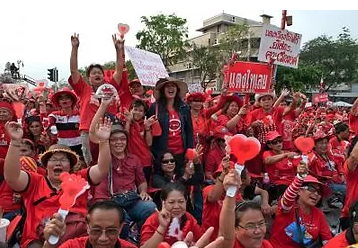Dissent for Democracy
By Vaishnavi Pallapothu
Source: ISReview
Since February 2020, Thailand has witnessed mass protests as thousands of people gather in Bangkok and other cities calling for a new constitution and an overturn of the monarchy, displaying immense and unprecedented resistance to the military. Demonstrators, protesters and activists have been defying the emergency decree that bans public gatherings of more than five people and have relentlessly showed up to voice their demands for democracy. While Prime Minister Prayut Chan-o-cha has supported an emergency parliamentary session on October 21 to discuss political reforms, he was against the idea of dismantling the monarchy.[1]
Women Take to the Streets
As in several protests in the recent past, be it in Sudan, India or Belarus, women have been involved front and centre in protests in Thailand, too. Many of them students, these Thai women have been at the forefront of organising demonstrations, rallying and mobilising people for protests. While the primary reason for the widespread agitations remains demands for constitutional reform, women are taking this opportunity to also bring progressive and feminist ideas to the old guard. To this end, abortion, taxes on menstrual products and conservative rules on dress codes have all been discussed on the national stage. They have also called for the dismantling of patriarchal institutions in Thailand’s monarchy, government, military and Buddhist monkhood.[2]
However, this has not been an easy battle as women in Thailand have received the brunt of sexist, discriminatory and outdated social and political moves for decades now. The prime minister, ironically the head of a national committee for gender equality, had claimed in 2016 that ‘society will deteriorate if women and men have equal rights’.[3] There is deeply rooted structural violence preventing women from rising up the ranks in both military and politics too – since 2019, the Royal Thai Police Cadet Academy banned female applicants and women occupy a paltry 14% of parliamentary seats.[3] As the uprising grew larger in size over the last few months, women have also spoken out against the classification of feminine hygiene products as cosmetics (subjecting such products to higher taxes), the salience of rape culture and the widening wage gap.[3]
Women’s rights and democracy
On August 16, women’s rights group, The Women For Freedom and Democracy group set up a station at the Democracy Monument and called for protestors to sign their petition to decriminalise abortion. The group was formed by women and LGBT activists and used this opportunity of mass mobilisation to call attention to issues of bodily autonomy and peaceful advocacy. Their station included colouring pages of vaginas and pieces of clothes for protestors to write down their visions for gender equality.[4] This was a powerful and subversive movement and not just in the occupation of public spaces to start conversations about taboo topics but also in that it was an inclusive and human-rights focused appeal for democracy on a personal and individual level. As activist Kornkanok Kamta rightly said “we cannot claim to be a true democracy when decisions about our bodies and reproductive health are still controlled by the government”.[2]
The highest echelons of Thailand’s leadership are male-dominated and leave no room for women to thrive, let alone enter and the succession rules of the monarchy state that the crown can only be passed down to men. Furthermore, since the 2014 military coup, the proportion of the central government’s budget towards military spending has skyrocketed and essential sectors such as health and education have faced drastic cuts. This has impacted rural and poor women and girls the most as they risk losing access to education.[5] Thailand’s fight for democracy, therefore, is and must be inherently feminist. Calling for demilitarisation, increased resource allocation for education and welfare as well as the fight for women’s rights is inexplicably intertwined with the fight for democracy.
Two sides of the same coin
Democracy and women’s rights do not exist in isolation. In fact, on the contrary, the reason why women all over the world have made such an impact on protests is because they bring in more legitimacy to a movement for democracy. Women’s autonomous organising within civil society makes it more likely that intersectional social and economic policies and laws are demanded. Additionally, the state’s institutional foundations will more likely take into account and work to remedy structural inequalities that subordinate women in private, public and political life. If women are to have recourse within Thailand, the current struggle for democracy must be coupled with gender-based issues so that women’s rights remain a top priority in the male-dominated space.
Ultimately, the goal should not just be democracy or the mere reformulation of a constitution. Rather, the goal should be to completely dismantle unequal and violent structures inherent in the monarchy and military, so that even a democratised state does not leave behind its women. If principles of gender equality are not firmly entrenched in the democratisation demands and process, then women will pay a high price.
References
1. H. Regan, (2020, October 19), Thailand's government vows to protect the monarchy after weekend of unrest, CNN, https://edition.cnn.com/2020/10/19/asia/thailand-weekend-protests-monarchy-intl-hnk/index.html
2. L. Rodriguez, (2020, September 25), How Young Women Are Leading Thailand’s Protests Against the Patriarchy, Global Citizen, https://www.globalcitizen.org/en/content/thailand-democracy-protests-gender-equality/
3. H. Beech and M. Suhartono, (2020, September 24), Young Women Take a Frontline Role in Thailand’s Protests, The New York Times, https://www.nytimes.com/2020/09/24/world/asia/thailand-protests-women.html
4. Prachatai, (2020, August 2016), Women’s rights group campaigns for abortion rights at Democracy Monument protest, Prachatai, https://prachatai.com/english/node/8726
5. Thai Enquirer, (2020, March 18), The struggle for democracy and the struggle for women’s rights are one and the same, Thai Enquirer, https://www.thaienquirer.com/9686/womenandthailand/
